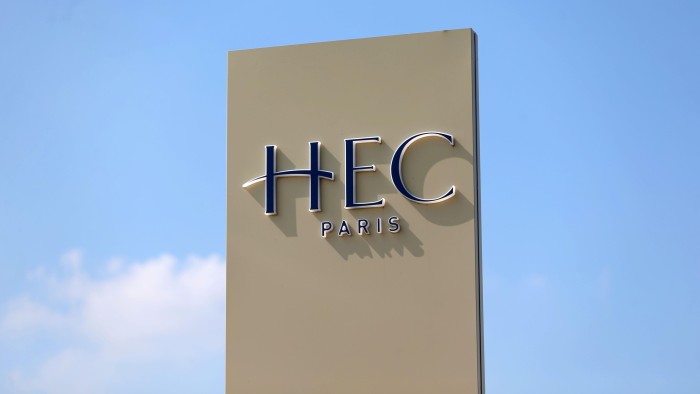FT European Business Schools Ranking 2022: tough times

Roula Khalaf, Editor of the FT, selects her favourite stories in this weekly newsletter.
HEC Paris heads the FT’s 2022 European Business Schools Ranking, one of four institutions based in France to make the top 10.
The French school is number one for the fourth consecutive year, and for a record 11th time overall. London Business School retains second place, ahead of ESCP, which has six campuses across Europe, followed by SDA Bocconi in Italy and the University of St Gallen in Switzerland.
This composite ranking is based on European institutions’ performance in the 2022 FT global rankings of MBAs, executive MBAs, Masters in Management and custom and open-enrolment non-degree executive education courses. Among the 95 schools are 24 in France, 18 in the UK and eight in Germany. There are three from Russia, two from Turkey and one each from Slovenia and the Czech Republic.
The data come at an important moment for European business schools, amid intensifying global competition for students and rising international tensions as Russia and China become more isolated. Russia’s war against Ukraine has cast a shadow over schools in the region, leaving students from both countries stranded abroad and, in some cases, causing faculty to flee. The war has also set back economic growth across Europe.
European Business Schools Ranking of 2022

See which schools reached our league table of 95 course providers. Plus, read the rest of our coverage here.
Meanwhile, Frank Bournois, dean of ESCP in Paris, said: “We are getting constant applications from Asia and particularly China, but we cannot send students there [for exchanges and placements]. The situation might open up next year but for now, with quarantine, it’s a real blocker for reciprocity.”
A recent survey by the Graduate Management Admission Council, which runs the GMAT admissions test, showed an overall decline in applications for business masters programmes in Europe and North America. GMAC attributed this partly to employers seeking to discourage staff from quitting to take further education courses in the wake of the Covid-19 pandemic and attempting to retain staff in the face of resignations and tight labour markets.
European schools nonetheless remain popular. “[They] provide a quality education for a fraction of the cost charged by leading business schools in the US,” said Eric Cornuel, president of the European Foundation for Management Development (EFMD), which accredits institutions globally.
He argued that European schools offer strong career services and internships, have a “tradition of international mobility and collaborative spirit”, are “rooted in the European spirit of diversity and liberal values”, and “are located in very attractive destinations, which helps in their global branding”. Cornuel added that many European schools are building on rising demand to focus on ethics and sustainability in their courses, alongside the need to foster skills around topics such as digital transformation.
The UK has continued to report relatively strong demand from international students, despite the turmoil since Brexit. Changes to the country’s visa regime and a drop in sterling’s value have mitigated the feared impact and underpinned applications from abroad.
“The biggest differential for Europe is languages,” said Amber Wigmore Alvarez, chief talent officer at Highered, the online careers platform for EFMD. “Students have worked and studied abroad in multinational and multicultural environments, and are open to those careers. You don’t see that so much in US and Asian schools.”
Bournois at ESCP said some business schools across Europe are developing shorter online executive education courses and joint diplomas, giving students the opportunity to study for degrees in business combined with engineering and other subjects.
The FT ranking’s methodology compensates to identify top-performing schools even when they do not offer the full range of ranked qualifications. It adjusts for those offering joint programmes and includes several institutions that were not in the final published rankings of leading global schools.
Individual rankings, including for Masters in Management, MBA and Executive MBA, are based on factors such as alumni salaries, career progression and international course experience, as well as research impact and gender balance among students, faculty and advisory boards.
HEC Paris ranked top in Europe for short custom and open executive programmes, Insead for the MBA and the EMBA (for its joint programme with Tsinghua in Beijing), and the University of St Gallen for the Masters in Management.
Average European salaries, adjusted for international purchasing power parity three years after completion of MBAs, ranged from $67,000 at Audencia in western France to nearly $187,000 at Insead, which has campuses in Paris and Singapore. The figures exclude alumni on the highest and lowest salaries for each school.
For EMBAs, average salaries ranged from $92,000 at ISEG in Lisbon to nearly $400,000 for Insead’s joint programme with Tsinghua. For Masters in Management, they ranged from $40,000 at Henley Business School in the UK to $138,000 at the University of St Gallen.
The University of Zurich has the lowest share of female faculty, at 15 per cent, while 10 schools achieve gender parity. The share of international faculty is as low as zero at Italy’s Bologna Business School, rising to 98 per cent at IMD in Switzerland.
Comments